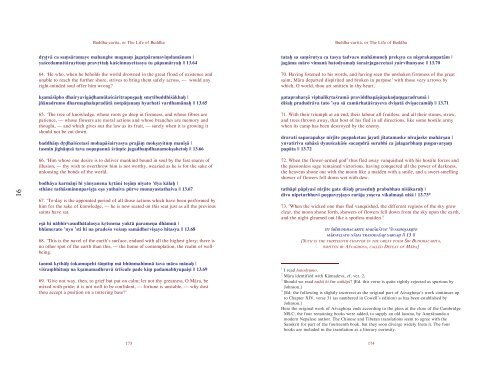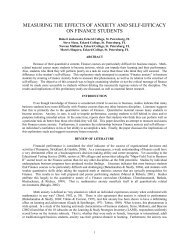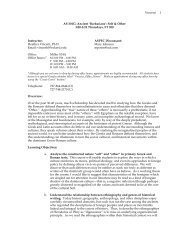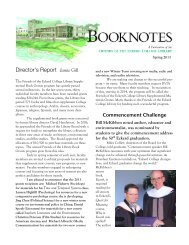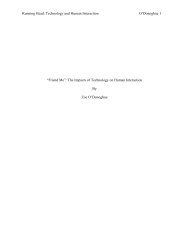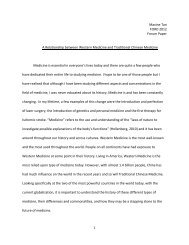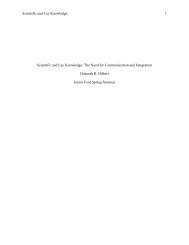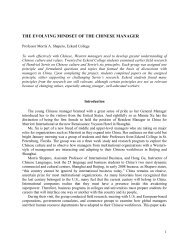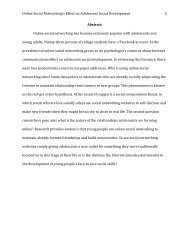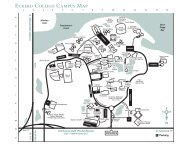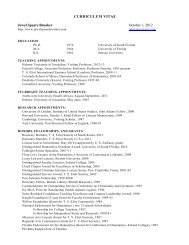Create successful ePaper yourself
Turn your PDF publications into a flip-book with our unique Google optimized e-Paper software.
91<br />
<strong>Buddha</strong>-carita, or <strong>The</strong> Life of <strong>Buddha</strong><br />
dÔùñvà ca saüsàramaye mahaughe magnaü jagatpàramaviüdamànam |<br />
yaècedamuttàrayituü pravÔttaþ kaècinnayettasya tu pàpamàryaþ || 13.64<br />
64. `He who, when he beholds the world drowned in the great flood of existence and<br />
unable to reach the further shore, strives to bring them safely across, Þ would any<br />
right-minded soul offer him wrong?<br />
kùamàèipho dhairyavigàóhamålaècàritrapuùpaþ smÔtibuddhièàkhaþ |<br />
jÿànadrumo dharmaphalapradàtà notpàñanaü hyarhati vardhamànaþ || 13.65<br />
65. `<strong>The</strong> tree of knowledge, whose roots go deep in firmness, and whose fibres are<br />
patience, Þ whose flowers are moral actions and whose branches are memory and<br />
thought, Þ and which gives out the law as its fruit, Þ surely when it is growing it<br />
should not be cut down.<br />
baddhàü dÔóhaiècetasi mohapàèairyasya prajàü mokùayituü manãùà |<br />
tasmin jighàüsà tava nopapannà èràüte jagadbaüdhanamokùahetoþ || 13.66<br />
66. `Him whose one desire is to deliver mankind bound in soul by the fast snares of<br />
illusion, Þ thy wish to overthrow him is not worthy, wearied as he is for the sake of<br />
unloosing the bonds of the world.<br />
bodhàya karmàõi hi yànyanena kÔtàni teùàü niyato 'dya kàlaþ |<br />
sthàne tathàsminnupaviùña eùa yathaiva pårve munayastathaiva || 13.67<br />
67. `To-day is the appointed period of all those actions which have been performed by<br />
him for the sake of knowledge, Þ he is now seated on this seat just as all the previous<br />
saints have sat.<br />
eùà hi nàbhirvasudhàtalasya kÔtsnena yuktà parameõa dhàmnà |<br />
bhåmerato 'nyo 'sti hi na pradeèo veèaü samàdherviùayo hitasya || 13.68<br />
68. `This is the navel of the earth's surface, endued with all the highest glory; there is<br />
no other spot of the earth than this, Þ the home of contemplation, the realm of wellbeing.<br />
tanmà kÔthàþ èokamupehi èàütiü mà bhånmahimnà tava màra mànaþ |<br />
vièraübhituü na kùamamadhruvà èrãècale pade kiü padamabhyupaiùi || 13.69<br />
69. `Give not way, then, to grief but put on calm; let not thy greatness, O Màra, be<br />
mixed with pride; it is not well to be confident, Þ fortune is unstable, Þ why dost<br />
thou accept a position on a tottering base?'<br />
173<br />
<strong>Buddha</strong>-carita, or <strong>The</strong> Life of <strong>Buddha</strong><br />
tataþ sa saüèrutya ca tasya tadvaco mahàmuneþ prekùya ca niùprakaüpatàm |<br />
jagàma màro vimanà hatodyamaþ èarairjagaccetasi yairvihanyase || 13.70<br />
70. Having listened to his words, and having seen the unshaken firmness of the great<br />
saint, Màra departed dispirited and broken in purpose 1 with those very arrows by<br />
which, O world, thou art smitten in thy heart.<br />
gatapraharùà viphalãkÔtaèramà praviddhapàùàõakaóaügaradrumà |<br />
dièaþ pradudràva tato 'sya sà camårhatàèrayeva dviùatà dviùaccamåþ || 13.71<br />
71. With their triumph at an end, their labour all fruitless, and all their stones, straw,<br />
and trees thrown away, that host of his fled in all directions, like some hostile army<br />
when its camp has been destroyed by the enemy.<br />
dravati saparapakùe nirjite puùpaketau jayati jitatamaske nãrajaske mahàrùau |<br />
yuvatiriva sahàsà dyauècakàèe sacaüdrà surabhi ca jalagarbhaü puùpavarùaü<br />
papàta || 13.72<br />
72. When the flower-armed god 2 thus fled away vanquished with his hostile forces and<br />
the passionless sage remained victorious, having conquered all the power of darkness,<br />
the heavens shone out with the moon like a maiden with a smile, and a sweet-smelling<br />
shower of flowers fell down wet with dew.<br />
tathàpi pàpãyasi nirjite gate dièaþ praseduþ prababhau nièàkaraþ |<br />
divo nipeturbhuvi puùpavÔùñayo raràja yoùeva vikalmaùà nièà | 13.73*<br />
73. 3 When the wicked one thus fled vanquished, the different regions of the sky grew<br />
clear, the moon shone forth, showers of flowers fell down from the sky upon the earth,<br />
and the night gleamed out like a spotless maiden. 4<br />
iti èrãbuddhacarite mahàkàvye 'èvaghoùakÔte<br />
màravijayo nàma trayodaèaþ sargaþ || 13 ||<br />
[Such is the thirteenth chapter in the great poem øri <strong>Buddha</strong>carita,<br />
written by Aèvaghosa, called Defeat of Màra]<br />
1<br />
I read hatodyamo.<br />
2<br />
Màra identified with Kàmadeva, cf. ver. 2.<br />
3<br />
Should we read tathà hi for tathàpi? [Ed. this verse is quite rightly rejected as spurious by<br />
Johnson.]<br />
4<br />
[Ed: the following is slightly incorrect as the original part of Aèvaghoùa's work continues up<br />
to Chapter XIV, verse 31 (as numbered in Cowell's edition) as has been established by<br />
Johnson.]<br />
Here the original work of Aèvaghoùa ends according to the gloss at the close of the Cambridge<br />
MS.C; the four remaining books were added, to supply an old lacuna, by AmÔtànanda a<br />
modern Nepalese author. <strong>The</strong> Chinese and Tibetan translations seem to agree with the<br />
Sanskrit for part of the fourteenth book, but they soon diverge widely from it. <strong>The</strong> four<br />
books are included in the translation as a literary curiosity.<br />
174


